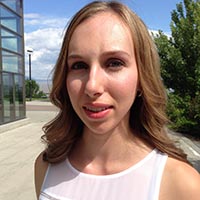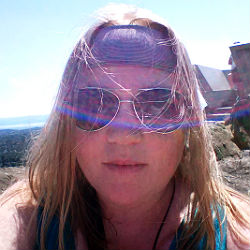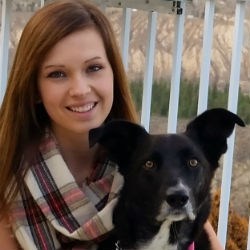Arts Menu
Student Success
The right combination of biology and behaviour
Before attending TRU, Leah Chadwick underestimated the value of small classes. She won't do that again.
“TRU's low student-to-professor ratio allows for a lot of one-on-one time, which enables professors to really get to know their students and their academic and professional goals.
“Now that I am currently looking into graduate schools, accessible professors who really care about my future has turned out to be a huge benefit.”
Leah settled on a psychology major because it combines her interests in biology and human behaviour.
“It made sense that studying the biological functions of the brain that produce behaviour would have me completely captivated.”
The psychology program covers a lot of territory, including biology, sociology, statistics and law, which made it all the better.
“And courses are offered with focus on specific streams within the field, from clinical and applied practice to experimental and research-based topics.”
Leah's Arts degree has helped her develop and refine skills such as critical thinking, communication, reasoning, creativity and problem solving.
“I have also learned how to conduct high-quality research, enhanced my public speaking abilities and improved my interpersonal skills.”
Also helping her grow as both a student and a person were Study Abroad semesters in Perth, Australia, and Tianjin, China.
“Living in a new environment encouraged the development of important skills such as communication, resourcefulness, empathy, cultural awareness and a global perspective.”

It made sense that studying the biological functions of the brain that produce behaviour would have me completely captivated. Leah Chadwick
Psychology makes for natural transition to law school
All it took was an introductory psychology course, and Natalie Paul was hooked.
“They give you such a broad overview of what psychology’s actually about. You realize there’s so many different paths you can take.
“TV shows sort of attracted me initially, but you uncover all the hidden truths about what psychology is actually about.”
Like many TRU students, Natalie was impressed by the intimate class sizes and the chance to get know professors one on one. But she’ll never forget the opportunity she had to attend the American Psychological Sciences conference in New York.
“The majority of students from universities across North America were post-graduate students and we were all undergraduate students. So you get that hands-on experience and you get to do things that I don’t think you would otherwise do at a bigger university.”
As Natalie continues her education in law school, she sees her psychology major as a definite asset.
“Psychology and the law in certain circumstances can actually intertwine. I’ve talked to lawyers in the community and they say the same thing — that they think psychology will play a greater role in the legal system in the future.”

Psychology and the law in certain circumstances can actually intertwine. Natalie Paul
Mature student takes step toward counselling career
During her 25 years working with people with disabilities, Kelly Inglis built up a strong interest in psychology. But it wasn’t until her children approached university age that she decided to do what she was encouraging them to do — pursue higher education.
“I began looking into enrolling at TRU and found the faculty so encouraging and supportive.”
What Kelly discovered about psychology was more than she had anticipated.
“Learning more about the study of the mind and behavior was expected, but — as naïve as it sounds — as a new student what surprised me the most is that it is science based. What I thought I knew wasn’t based on fact.”
Kelly looks forward to a career in counselling where she can encourage others to overcome adversity and fulfil their potential.
“I feel so grateful for the wisdom and guidance of the Arts instructors. As a mature student and mother of four children who are and will be attending TRU, the feeling of respect and inclusion has meant everything.”
Any doubts about succeeding as an older student were soon dispelled for this single mom. She continues to be inspired when she sees others like her.
“Advice I would give to mature students is that it can be done. Just know that when I pass you in the halls, I’m thinking how amazing you are to have life experience and the courage to pursue your education.”

As a mature student and mother of four children who are and will be attending TRU, the feeling of respect and inclusion has meant everything. Kelly Inglis
A good way to better understand people
Courtney Bennett’s fascination with psychology started with the first course she took in high school, and she followed through with a major at TRU.
“I love how extensive the field is. From clinical to experimental, there seems to be a niche for every interest.”
She jumped in with TRU Start, a tuition-free program that gives high school students credits for taking university courses.
“TRU has been a wonderful university to attend. It offers small classes, which means that you and your professors get to know each other on a first-name basis and provides a great avenue in terms of networking. Some of the best reference letters I have used for scholarships over the past four years have been from my professors.”
Her entire post-secondary education has been funded through scholarships and bursaries.
“They aren't always easy to apply for. The process can be tedious as each application seems to get more extensive than the one previous, but it pays off in the long run.”
Along with research skills, psychology has given her a better understanding of people and has strengthened her communication abilities. Overall, Courtney has found that an Arts degree is essential as she moves on to law school.

From clinical to experimental, there seems to be a niche for every interest. Courtney Bennett

